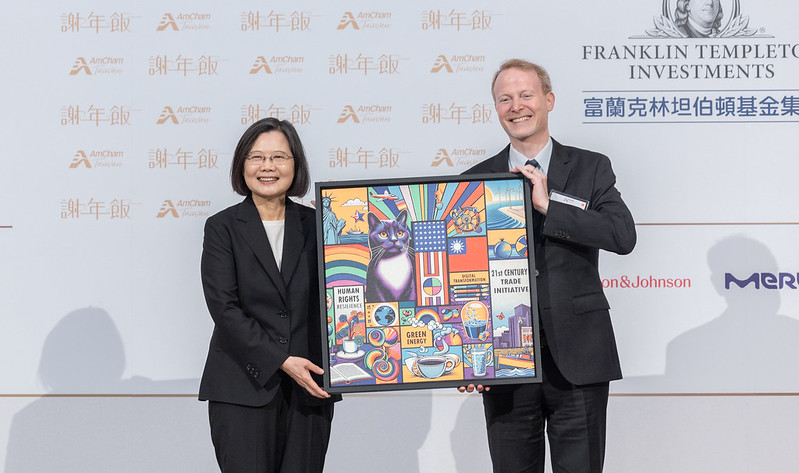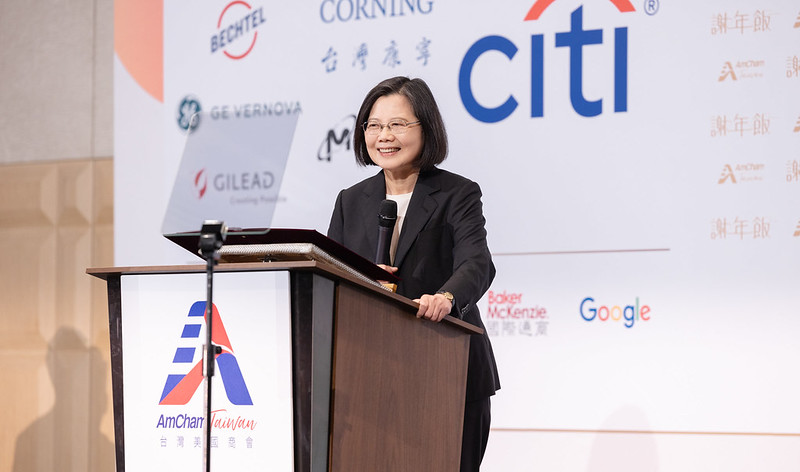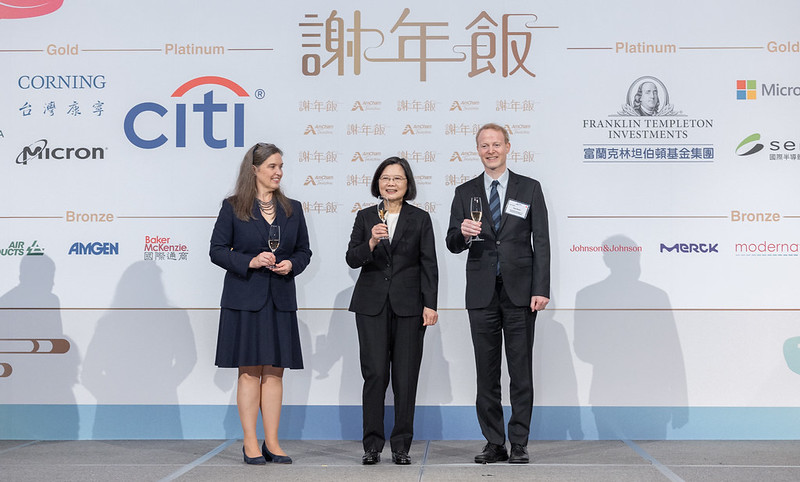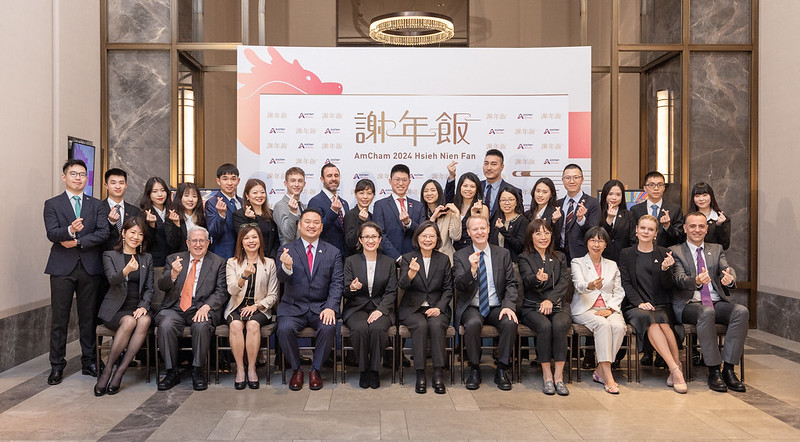News & activities
 News releases
News releases
On the evening of March 28, President Tsai Ing-wen attended the annual Hsieh Nien Fan (謝年飯) banquet hosted by the American Chamber of Commerce in Taiwan (AmCham Taiwan). In remarks, President Tsai said that in the past few years, we have navigated through many twists and turns, but that Taiwan is proving resilient and reliable in the face of uncertainty, and that we have also seen Taiwan's enduring partnership with the United States. The president thanked AmCham for having given Taiwan its steadfast support and its vote of confidence, and expressed optimism that we will advance steadily onwards on the solid foundations we have all helped to lay. As we continue down the road of freedom and democracy, President Tsai said, she hopes that both Taiwan and AmCham will continue to reach new achievements and set ever higher goals.
A transcript of President Tsai's remarks follows:
It is a pleasure to be here for my eighth Hsieh Nien Fan, hosted by the American Chamber of Commerce Taiwan. Meaning, I am coming to say goodbye to you as president. It is also heartening that for eight straight years, I have been able to sit down with you all for a nice meal and good conversation. So, thank you again for making this night such a welcoming tradition.
For over 70 years, AmCham has given Taiwan its steadfast support. But more than that, it has been an essential link connecting Taiwan with the United States and the global community.
To start off, there are a few people here tonight I want to recognize. First, of course, I want to congratulate Mr. Dan Silver, who took over as AmCham chairperson for the second time. He served as chairperson in 2016, and during that time he worked with our government agencies in bettering our relevant regulatory practices. I am sure that with his leadership and experience, he will help make the business environment here in Taiwan even more friendly.
And I also want to take a moment to recognize AmCham President Mr. Patrick Lin (林博智). Having taken on this role last July, President Lin brings with him an impressive record. And I look forward to seeing him draw on his experience to push our economic relations even further ahead.
And above all else, I give my heartfelt thanks to AmCham, its leadership, and all its members for everything you have done for Taiwan. The success of the Taiwan-US partnership is, in no small part, thanks to your efforts.
In the past few years, we have navigated through many twists and turns. From US-China trade tensions, to the unprecedented COVID-19 pandemic, and Russia's invasion of Ukraine, we have witnessed events that have shaken up the global political order and sparked widespread inflation.
Nevertheless, Taiwan has emerged from these challenges stronger. We have continued on a path of stable economic growth, showing just how resilient and adaptable our economy, our industry, and our people really are.
And this was especially true during the pandemic, which challenged and tested countries' ability to provide help to one another. Amidst these troubles, Taiwan stepped up and offered supports.
Our "Taiwan Can Help" initiative sent a clear message, that is, Taiwan will not be a passive bystander. Rather, we will continue to be a responsible member of the international community. Whenever the world is faced with a crisis, it can count on Taiwan to make a difference.
Thanks to the joint efforts of the government and the people these past eight years, Taiwan has met the challenges facing us head on, and has continued to see steady growth. Taiwan's GDP stayed on an upward trend, nearing US$760 billion in 2023, an over 30 percent – that's too conservative – 39 percent increase from 2016.
Similarly, we have seen tremendous development in the Taiwan Stock Exchange. I am sure you have all seen the TAIEX rise over 20,000 points for quite some time; and this is more than two times the figure from 2016.
I do not know how many of you have invested in the Taiwan stock market. If you do, congratulations.
And I would like to thank you for your contribution to our revenue. The finance situation in Taiwan has been rather okay with your contribution as investors in the stock market.
Overall, Taiwan's economy has maintained robust performance. From 2016 to 2023, we averaged over 3.1 percent economic growth, outpacing the global average; and in 2021 we saw a record 6.62 percent.
We are very glad to have you with us along the way, and appreciate your continued confidence in Taiwan.
That confidence is reflected in AmCham's 2024 Business Climate Survey. Over 80 percent of the respondents expressed optimism for Taiwan's economic prospects, and also for business revenue growth. In fact, optimism for those two items surged by 10 percent since last year. And, as mentioned by Mr. Silver just now, 92 percent said they are looking to maintain or increase their investments in Taiwan in the next year.
It is also encouraging that in the International Institute for Management Development's (IMD's) World Competitiveness Ranking, Taiwan has risen for five straight years, ranking sixth overall in 2023. And in the Heritage Foundation's recent Index of Economic Freedom, Taiwan ranked fourth in the world for the second year in a row.
It is fair to say that across various metrics, Taiwan is proving resilient and reliable in the face of uncertainty.
I would like to thank you for your vote of confidence, and assure you that we are doing our utmost to put Taiwan in the best possible position, so that we can remain competitive.
As of this month, our Three Major Programs for Investing in Taiwan have helped bring in over US$70 billion in homebound investments, and more than 150,000 jobs.
And since 2016, we have implemented several plans, such as our Forward-looking Infrastructure Development program, Six Core Strategic Industries policy, and Taiwan's Pathway to Net-Zero Emissions in 2050, all aimed at future-proofing our infrastructure and industries.
Just in green transition, for instance, we are seeing our policy work pay off. Taiwan's overall installed capacity for renewable energy is now 3.8 times what it was in 2016, with a seven-fold growth in wind and solar.
As far back as 2017, the year we designated as "year zero" for Taiwan's AI industry, we began drafting policies for AI development. Our AI Taiwan Action Plan, and its updated version – the Action Plan 2.0, have helped prepare Taiwan for this growth industry.
Infrastructure and technology are crucial, but the real heart of excellence in Taiwan is in the people. That is why, these past several years, we have been doing even more to strengthen our human capital.
Launched in 2018, our Taiwan Employment Gold Card makes it easier for international talents to live and work in Taiwan. To date, over 9,000 of these cards have been issued.
Last November we established our International Talent Taiwan Office. This one-stop facility provides services to foreign professionals, ranging from visa applications to even their children's education. Together with other programs like the Gold Card, the office is part of our effort to make Taiwan a hub for world-class talents.
The government has also worked with the industry to establish six semiconductor institutes at our top universities. There are more institutes in the pipeline, gearing towards AI, smart manufacturing, circular economy, and others. These institutes are to provide advanced training to bridge the gap between university education and the skills and training that the industry requires.
Of course, in these efforts, we cannot overstate the part played by Taiwan's enduring partnership with the US.
This year will mark the 45th anniversary of the Taiwan Relations Act. This legislation has been the cornerstone of maintaining peace and stability across the Taiwan Strait. The Taiwan Relations Act has also brought Taiwan and the US closer. Over the last four decades, the US has become our second-largest trading partner, while Taiwan is the eighth-largest trading partner of the United States. And the US is Taiwan's third-largest source of foreign capital.
In recent years, there have been even greater steps forward for our trade ties. Through the Taiwan-US Economic Prosperity Partnership Dialogue (EPPD) and the Taiwan-US Technology Trade and Investment Collaboration Framework (TTIC), we are bolstering cooperation in supply chains and green transition. Also, just last month, we signed an MOU on international development cooperation.
The highlight of recent years was, of course, the signing of the first agreement under the Taiwan-US Initiative on 21st-Century Trade. The second-round negotiation is ongoing, and future agreements will only make firmer foundations for our partnership.
Like many here tonight, I look forward to the efforts we have made together, in resolving the issue of double taxation between Taiwan and the US, producing concrete results soon. For that, I remain optimistic, and I must give a special thanks to AmCham for its consistent advocacy through such channels as its White Paper.
I am also delighted by the progress we have made with the different state governments in the United States. Last March, Arizona opened its trade and investment office in Taiwan, and Virginia opened its office last September. New Jersey has plans to have its own office here. And Michigan just this month announced its first-ever Taiwan office. These offices will help deepen Taiwan-US economic relations on the whole, and I welcome other US states to set up offices here as well.
It has been, without a doubt, a remarkable time for Taiwan-US relations. All of it was made possible thanks to the work of so many people, here in Taiwan and in the US. So, tonight, I want to thank AmCham and its members again for a fruitful eight years. Thank you.
Now, the future. On January 13 this year, Vice President Lai Ching-te was elected as our next president. While no one can tell what the future has in store, I am confident to say that Taiwan will continue to stay on the right path; to keep the political and economic landscape stable and secure; and to uphold continuity and stability in its policies. We will advance steadily onwards, thanks to the solid foundations that you all helped to lay.
President-elect Lai has pledged, with his National Project of Hope, to make Taiwan more democratic and peaceful; innovative and prosperous; just and sustainable. Through that Project, he hopes to continue the story of Taiwan's democratic success and make it a source of pride to the world.
I am sure that as we continue down the road of freedom and democracy, both Taiwan and AmCham will continue to reach new achievements, and set ever higher goals.
So, thank you for the invitation to come here. And I talked about what happened in the eight years, while Mr. Silver was talking about just one year, but this is a good occasion for me to report to you what happened and what has been achieved in the last eight years. And it is proper that I use this time to say goodbye to you as president.
And there is one thing I want to mention: When I first came here as president, and I listened to what the chair had to say (I don't think it was you) about the policies and regulatory practices and a lot of other things about the government, I heard a lot of criticism. And it is so good tonight that I have heard nothing negative.
So thank you, Chairman Silver, for making this a warm occasion for me. And I hope you all have a very pleasant evening. Thank you.
After remarks, President Tsai, AmCham Chairperson Silver, and American Institute in Taiwan Taipei Office Director Sandra Oudkirk raised their glasses in recognition of the strong Taiwan-US friendship.












